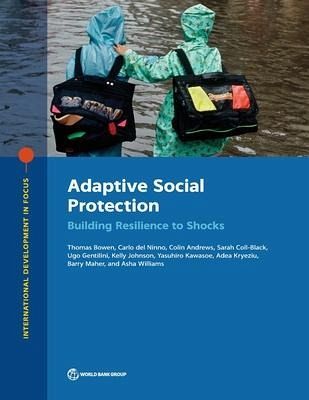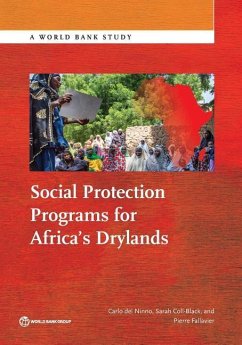
Adaptive Social Protection
Building Resilience to Shocks
Versandkostenfrei!
Versandfertig in über 4 Wochen
40,99 €
inkl. MwSt.

PAYBACK Punkte
20 °P sammeln!
Adaptive social protection (ASP) helps to build the resilience of poor and vulnerable households to the impacts of large, covariate shocks, such as natural disasters, economic crises, pandemics, conflict, and forced displacement. Through the provision of transfers and services directly to these households, ASP supports their capacity to prepare for, cope with, and adapt to the shocks they face--before, during, and after these shocks occur. Over the long term, by supporting these three capacities, ASP can provide a pathway to a more resilient state for households that may otherwise lack the res...
Adaptive social protection (ASP) helps to build the resilience of poor and vulnerable households to the impacts of large, covariate shocks, such as natural disasters, economic crises, pandemics, conflict, and forced displacement. Through the provision of transfers and services directly to these households, ASP supports their capacity to prepare for, cope with, and adapt to the shocks they face--before, during, and after these shocks occur. Over the long term, by supporting these three capacities, ASP can provide a pathway to a more resilient state for households that may otherwise lack the resources to move out of chronically vulnerable situations. Adaptive Social Protection: Building Resilience to Shocks outlines an organizing framework for the design and implementation of ASP, providing insights into the ways in which social protection systems can be made more capable of building household resilience. By way of its four building blocks--programs, information, finance, and institutional arrangements and partnerships--the framework highlights both the elements of existing social protection systems that are the cornerstones for building household resilience, as well as the additional investments that are central to enhancing their ability to generate these outcomes. In this report, the ASP framework and its building blocks have been elaborated primarily in relation to natural disasters and associated climate change. Nevertheless, many of the priorities identified within each building block are also pertinent to the design and implementation of ASP across other types of shocks, providing a foundation for a structured approach to the advancement of this rapidly evolving and complex agenda.







![Home Industries, Canada's National Policy, Protection to Native Products, Development of Field and Factory [microform]: Speeches by Leading Members of Cover Home Industries, Canada's National Policy, Protection to Native Products, Development of Field and Factory [microform]: Speeches by Leading Members of](https://bilder.buecher.de/produkte/65/65552/65552589n.jpg)

![Free Trade for the People, Protection for the Favored Few [microform] Cover Free Trade for the People, Protection for the Favored Few [microform]](https://bilder.buecher.de/produkte/66/66119/66119563n.jpg)


